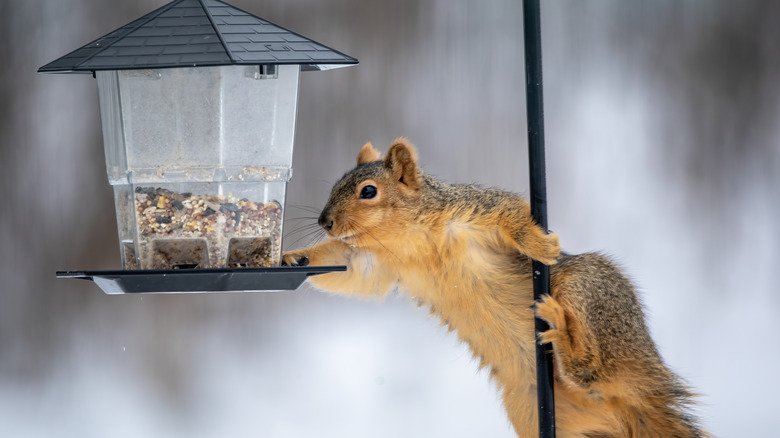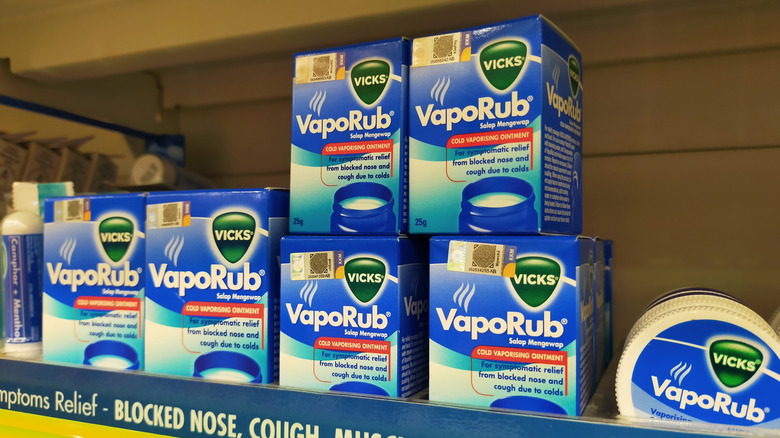Can A Dab Of Vicks VapoRub Really Stop Squirrels From Raiding Your Bird Feeder?
Squirrels have developed a reputation among homeowners for their relentless raids on backyard bird feeders, often turning peaceful bird watching sessions into a battle for food. No matter how high you seem to hang your feeders or how slippery you make the pole, they always find a way to get a fresh supply of seeds. But an unlikely household item is gaining attention as a simple, yet effective deterrent: Vicks VapoRub. Known for clearing up congestion and runny noses, this mentholated rub may also help clear squirrels out of your bird feeder zone. It may sound too easy to be true, but there's a surprisingly solid reason why this trick might actually work.
Squirrels rely heavily on their sense of smell to locate food, often sniffing out seeds and nuts before they see them. Anecdotal reports from gardeners suggest that many squirrels are put off by strong-smelling substances like peppermint and eucalyptus. Vicks VapoRub contains menthol—a compound derived from peppermint oil —as well as camphor and eucalyptus, all of which have potent, lingering scents. While there's limited scientific research confirming squirrels' aversion to these particular smells, garden and bird enthusiasts have found success using Vicks as a deterrent, likely because the odor mimics peppermint's intensity. The strong smell won't harm the animal, but it may be irritating enough to keep them from climbing or lingering near feeding areas in your garden.
The best part? It's a low-cost, low-effort fix that doesn't involve breaking out the animal traps and chemicals, or altering your bird feeding setup. While it may not be a perfect solution for every homeowner, Vicks VapoRub is a surprisingly effective first defense in the ongoing fight between bird-loving homeowners and pesky squirrels.
How to keep squirrels off your bird feeder
Using Vicks VapoRub as a squirrel deterrent is fairly straightforward, but there are a few tricks to make it more effective. Start by applying a thin layer of the rub to areas of the feeder that squirrels are most likely to interact with — think the base of the pole, hanging hooks, or the lid of the feeder. Be careful to avoid surfaces that birds use to perch or feed. The goal is to create a sensory wall that will deter squirrels before they cross it, but you don't want to interfere with how your feathery friends get their next meal. The gel will also serve as a physical deterrent against squirrel attacks on your feeders, as it makes surfaces extremely slippery.
You'll likely need to reapply the rub every few days, especially after heavy rainfall or extreme temperatures. These conditions can cause the smell to fade, making this trick less effective over time without consistent maintenance. Start with a small amount and observe how it affects the squirrels' behavior. Apply it generously to the feeder pole to prevent squirrels from climbing it, or on the edge of a feeder to make the most of both the scent and slippery nature of the gel.
If the Vicks doesn't seem to be working, there are other humane ways to keep pesky critters out of your yard. Try pairing the rub with a baffle, or dome-shaped barrier, on the feeder pole to make it more difficult to climb. You can also hang your feeder on a wire between two points with empty soda bottles strung along the line to spin and discourage squirrel acrobatics. Spicy birdseed flavored with capsaicin (which birds can't taste but squirrels hate) can be another effective way to deter squirrels from feasting on your birdseed.

